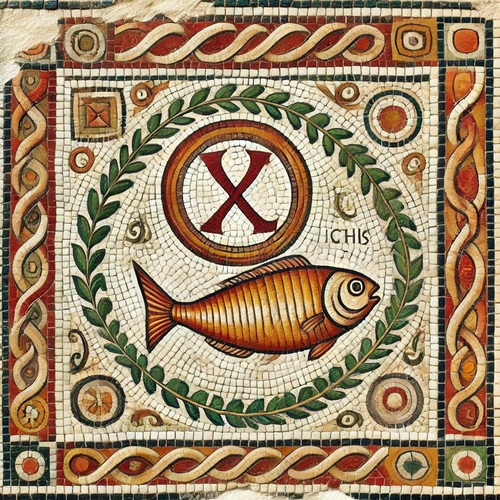Augustine's Confessions
Observations on Augustine's Confessions

Augustine. Confessions. Translated by Henry Chadwick. Oxford: Oxford Press, 1998.
Augustine of Hippo (354–430 AD) made many contributions to Christian theology and literature, earning him status as one of the most influential fathers in the Western Church (both Catholic and Protestant). For much of his early life, he followed the false beliefs and teachings of Manichaeism. After becoming a Christian and being baptized, Augustine returned to North Africa and became the bishop of Hippo, where he spent the rest of his life writing, preaching, and defending the Gospel of Jesus Christ against heresies. He wrote with influence on topics such as church doctrine (Catholic ecclesiology), soteriology, hermeneutics, the trinity, philosophical theology, and theological history.
Confessions is Augustine’s spiritual autobiography, in which he shares his journey from a pagan life filled with gross sin and pride to a new life of faith in Christ Jesus. Augustine's Confessions is an autobiographical work where Augustine reflects on his life, his spiritual journey, and his ultimate conversion to Christianity. Written in the form of prayers to God, the book recounts his early years of youthful indulgence and waywardness, including his involvement with Manichaeism, a popular religious sect of his day. Augustine narrates his growing dissatisfaction with worldly pleasures and intellectual pursuits, highlighting his internal struggles with sin, pride, and the search for truth.
The central theme of the Confessions is Augustine's longing for spiritual fulfillment, which he eventually finds through the teachings of Christianity. He recounts key moments leading up to his conversion, such as his encounter with the philosophy of Neoplatonism and his eventual realization that true wisdom could only be found in God. His mother's devout prayers and his friendships also played significant roles in shaping his journey toward faith. The moment of his conversion, famously triggered by a child's voice chanting "Take up and read," leads Augustine to read a passage from Paul's epistle to the Romans (ch.13 v. 13-14), solidifying his decision to embrace Christianity fully.
Confessions serves not only as a personal reflection on Augustine's spiritual development, but he also explores broader theological themes such as the nature of God, the problem of evil, and the human will. Augustine reflects deeply on the nature of time, memory, and the world's creation, blending his personal story with philosophical and theological insights. His work is a profound meditation on the transformative power of the Holy Spirit to change a person and the importance of self-examination in the life of faith.
Augustine’s thesis is very relevant to biblical counseling and pastoral care: Jesus Christ is the true power of God’s grace in overcoming man’s chief problem of sin and genuine life change. God can use trials, philosophical searching, and personal reflection to change human hearts.
Other noted works by Augustine include The City of God, On Christian Doctrine, On the Grace of Christ, and Original Sin. One of Confessions' significant strengths is its spiritual depth and honesty. Augustine gives a raw, reflective perspective on his struggles, sins, and transformation. Readers who might struggle similarly or believe their sins are too great for God’s mercy will find encouragement. Another strength is the numerous theological insights on many topics (the problem of evil, the nature of God, and the human condition). A weakness is that Augustine is not doctrinally correct on every matter, and the reader must remain discerning—for example, sex within the marital union is not restricted by the Bible to only procreation, as Augustine believes (p. 25). Readers should use caution with Augustine’s allegorical interpretation of scripture (p. 96). He equates the ‘firmament’ in the creation narrative as ‘Scriptures’ and ‘let there be light’ as soul-illumination by God’s truth versus visible light (285)-- which is an interesting thought but not exegetically correct.
In summary, Confessions is a timeless spiritual autobiography that will bless those who spend the time to read it. Nothing has changed. Sin ruins lives, and Jesus sets them free. Confessions offers readers a deeply personal account of one man’s transformation through faith. Augustine’s vivid storytelling, coupled with his profound theological insights, makes this work not only a reflection of his life but also a meditation on universal themes of grace, redemption, and the search for truth. For anyone grappling with life’s more profound questions or seeking to understand the power of faith, Confessions remains a compelling and thought-provoking read.
Augustine of Hippo (354–430 AD) made many contributions to Christian theology and literature, earning him status as one of the most influential fathers in the Western Church (both Catholic and Protestant). For much of his early life, he followed the false beliefs and teachings of Manichaeism. After becoming a Christian and being baptized, Augustine returned to North Africa and became the bishop of Hippo, where he spent the rest of his life writing, preaching, and defending the Gospel of Jesus Christ against heresies. He wrote with influence on topics such as church doctrine (Catholic ecclesiology), soteriology, hermeneutics, the trinity, philosophical theology, and theological history.
Confessions is Augustine’s spiritual autobiography, in which he shares his journey from a pagan life filled with gross sin and pride to a new life of faith in Christ Jesus. Augustine's Confessions is an autobiographical work where Augustine reflects on his life, his spiritual journey, and his ultimate conversion to Christianity. Written in the form of prayers to God, the book recounts his early years of youthful indulgence and waywardness, including his involvement with Manichaeism, a popular religious sect of his day. Augustine narrates his growing dissatisfaction with worldly pleasures and intellectual pursuits, highlighting his internal struggles with sin, pride, and the search for truth.
The central theme of the Confessions is Augustine's longing for spiritual fulfillment, which he eventually finds through the teachings of Christianity. He recounts key moments leading up to his conversion, such as his encounter with the philosophy of Neoplatonism and his eventual realization that true wisdom could only be found in God. His mother's devout prayers and his friendships also played significant roles in shaping his journey toward faith. The moment of his conversion, famously triggered by a child's voice chanting "Take up and read," leads Augustine to read a passage from Paul's epistle to the Romans (ch.13 v. 13-14), solidifying his decision to embrace Christianity fully.
- Romans 13:13–14 (ESV): "Let us walk properly as in the daytime, not in orgies and drunkenness, not in sexual immorality and sensuality, not in quarreling and jealousy. But put on the Lord Jesus Christ, and make no provision for the flesh, to gratify its desires."
Confessions serves not only as a personal reflection on Augustine's spiritual development, but he also explores broader theological themes such as the nature of God, the problem of evil, and the human will. Augustine reflects deeply on the nature of time, memory, and the world's creation, blending his personal story with philosophical and theological insights. His work is a profound meditation on the transformative power of the Holy Spirit to change a person and the importance of self-examination in the life of faith.
Augustine’s thesis is very relevant to biblical counseling and pastoral care: Jesus Christ is the true power of God’s grace in overcoming man’s chief problem of sin and genuine life change. God can use trials, philosophical searching, and personal reflection to change human hearts.
Other noted works by Augustine include The City of God, On Christian Doctrine, On the Grace of Christ, and Original Sin. One of Confessions' significant strengths is its spiritual depth and honesty. Augustine gives a raw, reflective perspective on his struggles, sins, and transformation. Readers who might struggle similarly or believe their sins are too great for God’s mercy will find encouragement. Another strength is the numerous theological insights on many topics (the problem of evil, the nature of God, and the human condition). A weakness is that Augustine is not doctrinally correct on every matter, and the reader must remain discerning—for example, sex within the marital union is not restricted by the Bible to only procreation, as Augustine believes (p. 25). Readers should use caution with Augustine’s allegorical interpretation of scripture (p. 96). He equates the ‘firmament’ in the creation narrative as ‘Scriptures’ and ‘let there be light’ as soul-illumination by God’s truth versus visible light (285)-- which is an interesting thought but not exegetically correct.
In summary, Confessions is a timeless spiritual autobiography that will bless those who spend the time to read it. Nothing has changed. Sin ruins lives, and Jesus sets them free. Confessions offers readers a deeply personal account of one man’s transformation through faith. Augustine’s vivid storytelling, coupled with his profound theological insights, makes this work not only a reflection of his life but also a meditation on universal themes of grace, redemption, and the search for truth. For anyone grappling with life’s more profound questions or seeking to understand the power of faith, Confessions remains a compelling and thought-provoking read.
Augustine's Confessions is in the public domain and can be obtained for free at many libraries and online. If you'd like to obtain a personal copy, here is a link to the copy I recently read.
Posted in Coffee Hour w/ Pastor John
Posted in Augustine, Confessions, Carthage, North Africa, Rome, Sexual Immorality, Faith, Conversation, Becoming a Christian, Hippo, Catholic, Manichaeism, Church Father, pride, Sexual Morality, Romans 13:13-14, Take up and Read, spiritual autobiography, redemption, early church
Posted in Augustine, Confessions, Carthage, North Africa, Rome, Sexual Immorality, Faith, Conversation, Becoming a Christian, Hippo, Catholic, Manichaeism, Church Father, pride, Sexual Morality, Romans 13:13-14, Take up and Read, spiritual autobiography, redemption, early church
Recent
Is Jesus God?
January 20th, 2026
Did God Approve of Polygamy
January 12th, 2026
Entering the New Year Anchored, Not Anxious
January 2nd, 2026
Why Christmas Matters: Immanuel, Prophecy, and God’s Perfect Timing
December 13th, 2025
The Truth About the “Spirit of Jezebel”: Why the Idea Is Not Biblical — and Why It Is Spiritually Dangerous
December 2nd, 2025
Archive
2025
April
September
October
2024
February
April
July
December
2023
